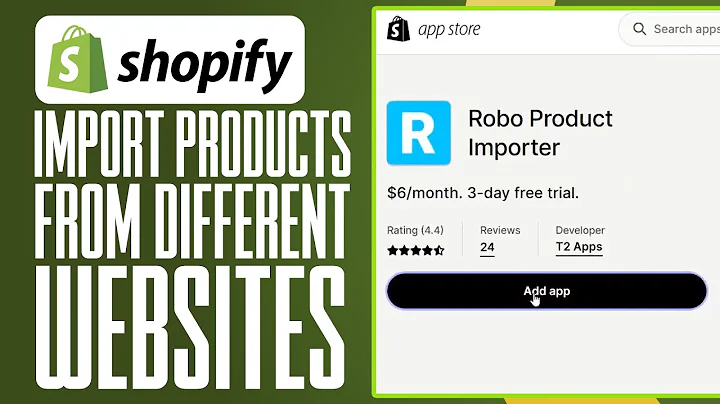Expand Your Handmade Business: Etsy Alternatives
Table of Contents
- Introduction
- Etsy: A Leading Marketplace for Handmade Goods
- Pros of Selling on Etsy
- Cons of Selling on Etsy
- Shopify: Building Your Own Online Store
- Pros of Using Shopify
- Cons of Using Shopify
- Amazon Handmade: Reaching a Wide Audience
- Pros of Selling on Amazon Handmade
- Cons of Selling on Amazon Handmade
- Bonanza: Diversifying Your Sales Channels
- Pros of Selling on Bonanza
- Cons of Selling on Bonanza
- Redbubble: Print-On-Demand for Artwork
- Pros of Selling on Redbubble
- Cons of Selling on Redbubble
- eBay: A Well-Known Online Marketplace
- Pros of Selling on eBay
- Cons of Selling on eBay
- Folksy: UK's Alternative to Etsy
- Pros of Selling on Folksy
- Cons of Selling on Folksy
- Just Artisan: A New Handmade Marketplace
- Pros of Selling on Just Artisan
- Cons of Selling on Just Artisan
- Choosing the Best Alternative to Etsy
- Conclusion
Etsy Alternatives: Expand Your Handmade Business
Etsy has long been recognized as a popular marketplace for buying and selling handmade, custom, and vintage goods. However, it is not the only option available for entrepreneurs looking to sell their handmade products. In this article, we will explore several alternatives to Etsy that can provide you with new opportunities to expand your business and increase your profits. Each alternative has its own unique features and advantages, so read on to find the best fit for your specific needs.
Etsy: A Leading Marketplace for Handmade Goods
Let's start by discussing the pros and cons of selling on Etsy.
Pros of Selling on Etsy
One of the biggest advantages of selling on Etsy is its vast and engaged community of over 80 million active buyers. This built-in audience can significantly increase your product visibility and potential sales. Additionally, Etsy provides a user-friendly platform that makes it easy to list and manage your products. The marketplace also offers various marketing tools and resources to help sellers promote their products effectively.
Furthermore, Etsy has established trust and credibility among buyers, which can make it easier for sellers to attract customers. The marketplace handles the payment process securely and provides protection against fraud for both buyers and sellers.
Cons of Selling on Etsy
While Etsy offers many benefits, there are some downsides to consider as well. One major drawback is the fees associated with selling on the platform. Etsy charges a $0.20 listing fee for each item, and a 5% transaction fee on the final sale price, including the shipping cost. These fees can add up, especially for sellers with a large inventory.
Another limitation of Etsy is the lack of control over the presentation and display of your products. Sellers have to work within the given templates and guidelines provided by Etsy, which may limit their creativity and branding options. Additionally, Etsy does not provide access to customer contact information, making it difficult to build direct relationships with your buyers.
Despite these drawbacks, Etsy remains a popular choice for many sellers due to its large customer base and established reputation. However, if you're looking for alternatives that offer greater control and flexibility, there are several options worth exploring.
Shopify: Building Your Own Online Store
Shopify is an excellent alternative to Etsy for sellers who want to have full control over their online store. With Shopify, you can create your own website and showcase your handmade goods to potential buyers. Unlike Etsy, there are no referral fees or restrictions on the design and branding of your store.
Pros of Using Shopify
One of the major advantages of using Shopify is the ability to keep all the profits from your sales. Unlike marketplaces like Etsy, Shopify does not charge any selling fees. You also have complete control over the presentation and display of your products, allowing you to create a unique and personalized brand experience for your customers.
Another benefit of using Shopify is the access to customer contact information. This enables you to build long-lasting relationships with your buyers and implement effective email marketing and other promotional strategies to generate repeat sales.
Cons of Using Shopify
However, it's important to note that Shopify does come with a monthly subscription fee, starting at $29 per month for the basic plan. Depending on your business needs, you may need to invest in higher-priced plans, which can range from $79 to $299 per month. While Shopify offers built-in payment processing through Shopify Payments, transaction fees apply if you choose to use a third-party payment gateway.
Additionally, unlike marketplaces like Etsy, Shopify does not have a built-in audience. You will need to drive your own traffic to your website through social media marketing, SEO, and other marketing strategies. This can require more effort on your part, especially if you're just starting and don't have an established customer base.
Despite these considerations, Shopify provides an excellent platform for sellers who want full control over their online store and the ability to build their brand. It offers a range of tools and integrations to help you manage your business effectively and increase your sales.
In the next section, we will explore another alternative to Etsy: Amazon Handmade. Stay tuned!









![[Tutorial] Create Stunning Shopify Product Pages with Pitchfly](https://i.ytimg.com/vi/3TDsuO26NIs/hq720.jpg?sqp=-oaymwEcCNAFEJQDSFXyq4qpAw4IARUAAIhCGAFwAcABBg==&rs=AOn4CLCmB2_PWUb4iLYhRcvwZs9VqAQgIg)








